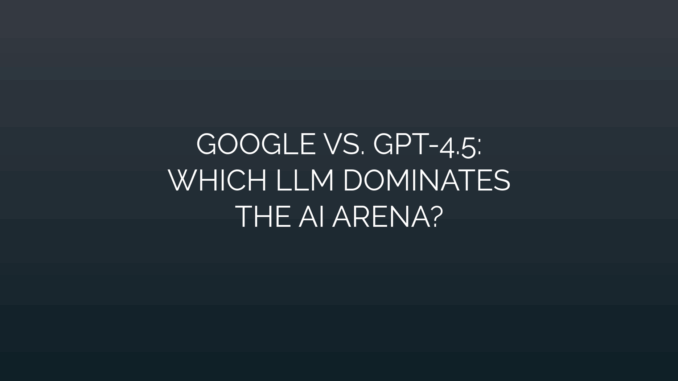
Google vs. GPT4.5: Which LLM Dominates the AI Arena?
The AI landscape is defined by fierce competition, with Google and OpenAI’s GPT4.5 emerging as leading large language models. Both push boundaries in reasoning, creativity, and realworld application, but critical differences in accessibility, integration, and core strengths shape their dominance. This analysis dissects their capabilities to determine which LLM leads today’s AI race.
Google Gemini: The Integrated Powerhouse
Google leverages its Gemini family of models, rooted in its proprietary infrastructure and vast data ecosystem. Unlike standalone LLMs, Gemini thrives within Google Workspace, Android, and Cloud services.
- Multimodal Mastery: Excels at processing text, images, audio, and video simultaneously—crucial for applications like Google Lens or live video analysis.
- Enterprise Integration: Seamlessly embeds into Gmail, Docs, Meet, and Vertex AI, streamlining workflows for corporate users.
- Search Synergy: Direct access to updated web data via Google Search enhances factual accuracy for queries requiring real-time information.
- Resource Efficiency: Optimized for scalable deployment across data centers and edge devices (e.g., smartphones).
Gemini’s weakness? Limited transparency. Google restricts API access and model details, prioritizing ecosystem control over open innovation.
GPT-4.5: The Generative Virtuoso
OpenAI’s GPT4.5 refines its predecessor with sharper reasoning, reduced hallucinations, and expanded context windows (up to 128K tokens). Its standalone architecture prioritizes generative flexibility.
- Developer-Friendly API: Offers extensive customization via OpenAI’s accessible platform, fostering third-party app development.
- Creative Superiority: Generates nuanced long-form content (prose, code, scripts) with higher coherence. Third-party benchmarks show advantages in linguistic creativity.
- Plugin Ecosystem: Supports external tools like browsers, code interpreters, and Retrieval-Augmented Generation (RAG) for specialized tasks.
- Open Research Ethos: Publishes detailed technical reports (unlike Google), accelerating academic and industry collaboration.
However, GPT4.5 operates outside native productivity suites. Users must bridge it to tools like Microsoft 365 manually.
Head-to-Head: Performance Benchmarks
Independent evaluations highlight complementary strengths:
- Reasoning & Coding:
- GPT-4.5 leads marginally in complex math (GSM8K) and programming tasks (HumanEval).
- Gemini Ultra rivals it in logical deduction but lags in abstract problem-solving.
- Accuracy & Hallucinations:
- Gemini minimizes factual errors using real-time Search data.
- GPT-4.5 reduces hallucination rates by 15% vs. GPT-4 but requires explicit tool integration for updates.
- Speed & Cost:
- Gemini 1.5 Pro processes queries 20% faster at scale, benefiting enterprise workflows.
- GPT-4.5 Turbo offers lower per-task costs for developers via tiered API pricing.
Strategic Differentiation: Ecosystems Matter
Google’s Dominance Play: Wins through ubiquity. Gemini powers Google Search, Gmail Smart Reply, and YouTube’s recommendation algorithms—reaching 4 billion users daily. Its B2B focus on AI integration for productivity makes it indispensable for businesses embedded in Google Cloud.
OpenAI’s Innovation Play: Prioritizes agility. GPT4.5 underpins diverse thirdparty tools, from ChatGPT’s consumer app to advanced enterprise workflows. Its partnership ecosystem (e.g., Microsoft Azure) fuels adoption without requiring vendor lockin.
The Verdict: Context Determines Dominance
No single LLM “wins” universally. Each dominates distinct arenas:
- Choose Gemini If:
- Your priority is multimodal analysis (e.g., processing video transcripts).
- You operate within Google’s ecosystem (Workspace/Cloud).
- Accuracy in dynamic, fact-based queries is critical.
- Choose GPT-4.5 If:
- You need superior generative output for content, code, or creative tasks.
- Customization via API and plugins is non-negotiable.
- You value transparency in model architecture and development.
Future Trajectories
Google plans deeper hardwareAI fusion (e.g., TPU v5 integration) and broader Assistant integration. OpenAI focuses on agentic capabilities, enabling GPT4.5 to autonomously execute multistep tasks. Both face challenges: regulatory scrutiny over data monopolization (Google) and intellectual property disputes (OpenAI).
Final Analysis
GPT4.5 retains an edge in generative versatility and developer appeal, while Gemini excels as a seamlessly integrated, multimodal tool for enterprise efficiency. The true winner is the AI industry—fueled by rivalry that drives faster innovation, lower costs, and increasingly sophisticated tools. For users, the decision hinges on alignment with workflow ecosystems and taskspecific demands. Neither model eclipses the other; they define complementary pillars of modern AI.
Leave a Reply